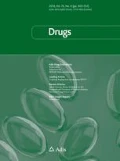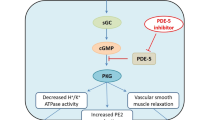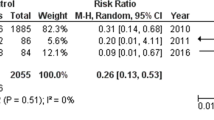Summary
Peptic ulcer develops when offensive factors overwhelm defensive processes in the gastroduodenal mucosa. Offensive factors include NSAIDs, hydrochloric acid-peptic activity, bile reflux, and some products of the lipoxygenase pathway such as leukotriene B4; whereas defensive processes are largely mediated by prostaglandins through poorly understood mechanisms uniformly termed cytoprotection. Cytoprotection, a physiological process working through the products of arachidonic acid metabolism, may result from the net effect of the protective actions of prostaglandins versus the damaging actions of leukotrienes. Some prostaglandins also have antisecretory effects. Therefore the peptic ulcer healing effects of prostaglandin analogues, all of which have significant antisecretory activity, may be more due to their antisecretory effects than primarily to their effects on mucosal defences. Certain drug-induced gastroduodenal lesions, e.g. NSAID-induced ulcers, which are often unresponsive to H2-receptor antagonists, have been healed and their recurrence prevented by the use of PGE1 and PGE2 analogues. All the prostaglandin analogues investigated to date in humans have the potential for inducing abortion, an important side effect which may limit their worldwide use. The optimal prostaglandin analogue for ulcer healing should not induce abortion and should be potently cytoprotective. The predominant damaging agent in the development of peptic ulcer disease is gastric hydrochloric acid. Thus, the worldwide established efficacy and safety of H2-receptor antagonists such as cimetidine, ranitidine, famotidine and most recently of roxatidine acetate suggest that these agents have become the standard by which other forms of anti-ulcer therapy should be judged.
Similar content being viewed by others
References
Ahlquist DA, Dozois RR, Zinsmeister AR, Malagelada JR. Duodenal prostaglandin synthesis and acid load in health and duodenal ulcer disease. Gastroenterology 85: 522–528, 1983
Bright-Asare P. Treatment of duodenal ulcer with enprostil, a prostaglandin E2analogue. American Journal of Medicine 81: 64–68, 1986
Bright-Asare P, Enrique C, Yamini S, Brown J, Robert A. Experimental duodenal ulcers are formed in the rat by indomethacin and 24-hours intraduodenal infusion of hydrochloric acid. Clinical and Investigative Medicine 9 (Suppl.): A62, 1986
Bright-Asare P, Giannikopoulos I, Whiten JT. Prostaglandins and chemotherapy-induced ulcers in dogs. Digestive Diseases and Sciences 30 (Suppl.): 201S–203S, 1985
Bright-Asare P, Sontag SJ, Gould RJ, Brand DL, Roufail WM. Efficacy of misoprostol (twice daily dosage) in acute healing of duodenal ulcer: a multicenter double-blind controlled trial. Digestive Diseases and Sciences 31: 63S-67S, 1986
Bright-Asare P, Whiten JT. Prostaglandins, gastroduodenal ulcer and hemorrhagic gastritis. Clinical Physiology and Biochemistry 2: 101–110, 1984
Brown J, Bright-Asare P, Enrique C, Yamini S, Robert A. Duodenal ulcers induced in rats by indomethacin plus reserpine are accompanied by increased gastric acid secretion. Clinical and Investigative Medicine 9 (Suppl.): A163, 1986
Giannikopoulos I, Bright-Asare P, Blackstone M, Gould R, Griffiths W, et al. Double-blind controlled pilot trial of a prostaglandin analogue (misoprostol cytotec) compared with potent antacids in subjects with acute moderate to severe UGI bleeding. Clinical and Investigative Medicine 9: A67, 1986
Hirschowitz BI, Berenson MM, Berkowitz J, Bright-Asare P, DeLuca VA, et al. A multicenter study of ranitidine treatment of duodenal ulcers in the United States. Journal of Clinical Gastroenterology 8: 359–366, 1986
Isenberg JI, Smedfors B, Johansson C. Effect of graded doses of intraluminal H+prostaglandin E2, and inhibition of endogenous prostaglandin synthesis on proximal duodenal bicarbonate secretion in unanesthetized rat. Gastroenterology 88: 303–307, 1985
Konturek SJ, Kwiecien N, Obtulowicz W, Koop B, Oleksy J. Double-blind controlled study on the effect of sucralfate on gastric prostglandin formation and microbleeding in normal and aspirin treated man. Gut 27: 1450–1456, 1986
Konturek SJ, Kwiecien N, Obtulowicz W, Oleksy J, Sito E. Comparison of carprofen and indomethacin on gastric secretion, mucosal integrity, and prostaglandin generation in normal subjects and duodenal ulcer patients (abstract). Gastroenterology 84: 1213, 1983
Lam SK, Hui WM, Lau WY, Branicki FJ, Lai CL, et al. Sucralfate overcomes adverse effect of cigarette smoking on duodenal ulcer healing and prolongs subequent remission. Gastroenterology 92: 1193–1201, 1987
Lam SK, Lam KC, Lai CL, Yeung CK, Yam LY, et al. Treatment of duodenal ulcer with antacid and sulpiride: a double-blind controlled study. Gastroenterology 76: 315–322, 1979
Lanza FL. A double-blind study of prophylactic effect of misoprostol on lesions of gastric and duodenal mucosae induced by oral administration of tolemetin in health subjects. Digestive Disease and Sciences 31: 131S-136S, 1986
Leung FW, Miller JC, Guth PH. Dissociated effects of misoprostol on gastric acid secretion and mucosal blood flow. Digestive Diseases and Sciences 31 (Suppl.): 86S–90S, 1986
McHardy GG. A multicenter, double-blind trial of sucralfate and placebo in duodenal ulcer. Journal of Clinical Gastroenterology 3 (Suppl.) 147–152, 1981
Robert A. Cytoprotection by prostaglandins. Gastroenterology 77: 761–767, 1979
Sharon P, Cohen F, Zifroni A, Karmeli F, Ligumski M, et al. Prostanoid synthesis by cultured gastric and duodenal mucosa: possible role in the pathogenesis of duodenal ulcer. Scandinavian Journal of Gastroenterology 18: 1045–1049, 1983
Wilson DE, Quadros E, Rajapaksa T, Adams A, Noar M. Effects of misoprostol on gastric acid and mucus secretion in man. Digestive Diseases and Sciences 31 (Suppl.): 126S–129S, 1986
Zinner MJ, Rypine E, Martin LF, Jonasson O, Hoover EL, et al. Misoprostol versus antacid in the prevention of stress bleeding and lesions in ICU patients: a multicenter prospective double-blind trial. Gastroenterology 92: 1711, 1987
Author information
Authors and Affiliations
Rights and permissions
About this article
Cite this article
Bright-Asare, P., Habte, T., Yirgou, B. et al. Prostaglandins, H2-Receptor Antagonists and Peptic Ulcer Disease. Drugs 35 (Suppl 3), 1–9 (1988). https://doi.org/10.2165/00003495-198800353-00003
Published:
Issue Date:
DOI: https://doi.org/10.2165/00003495-198800353-00003




